| Srl | Item |
| 1 |
ID:
187083
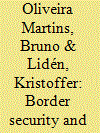

|
|
|
|
|
| Summary/Abstract |
The European Union’s effort at controlling its external borders is an endeavour that increasingly relies on digital systems: from tools for information gathering and surveillance to systems for communicating between different agencies and across member states. This makes EU borders a key site for the politics of “digital sovereignty” – of controlling digital data, software and infrastructures. In this article, we propose a new understanding of how the concepts of digital and sovereignty interplay: sovereignty by digital means, sovereignty of the digital, and sovereignty over the digital. We do it by analysing three key manifestations within the EU’s borderwork: firstly, the expansion of EURODAC to include facial biometric data; secondly, the creation of the (future) shared Biometric Matching System (sBMS); and thirdly, the EU-funded West Africa Police Information System (WAPIS). These databases and systems exemplify three transformations of EU borderwork that invoke different dimensions of digital sovereignty: expansion of techniques for governing migration; interoperability of EU databases facilitating the internalisation of borders through domestic policing; and extra-territorialization of borderwork beyond the geographic limits of the EU.
|
|
|
|
|
|
|
|
|
|
|
|
|
|
|
|
| 2 |
ID:
162778
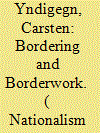

|
|
|
|
|
| Summary/Abstract |
The establishment of a Euroregion across the national border between Denmark and Germany at the end of the 1990s went unnoticed by the German public but mobilized widespread popular resistance on the Danish side led by Sønderjyllandskomiteen [the Committee for Southern Jutland]. The committee organized resistance towards European integration at the local level. Its discourse of protest was built around the key points that borders are inevitable in protecting national sovereignty, that in general European integration threatened the nation and the national identity and, specifically, that their German neighbor was regarded with circumspection because of the country’s historical legacy and traumatic past. The lessons learned from this case contribute to providing the groundwork for a more substantive critical approach to political currents, especially the populist political discourse that has predominated in European border debate in recent decades.
|
|
|
|
|
|
|
|
|
|
|
|
|
|
|
|
| 3 |
ID:
188532
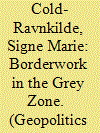

|
|
|
|
|
| Summary/Abstract |
EU externalised border control has become a bone of contention in EU–Malian relations. Based on fieldwork among Malian state officials, migrant associations and EU staff in Bamako, the article explores readmission agreements and border police collaboration. By examining the often-underestimated agency of national authorities, the article shows how EU border interventions aimed at producing control and confinement deep within the EU–African borderlands are contested and shaped by Malian state actors’ ‘borderwork’ (Rumford 2008). It argues that the contentious border politics produce ‘hidden acts’ through which moments of ‘sovereign exception’ (Agamben 1998) are produced in the ‘grey zone’ (Feldman 2019) of Europe’s externalised migration–security apparatus. Meanwhile, in the grey zone state actors’ everyday tactics of resistance are constitutive of new forms of sovereignty that is agency enabling.
|
|
|
|
|
|
|
|
|
|
|
|
|
|
|
|
| 4 |
ID:
184334
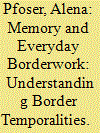

|
|
|
|
|
| Summary/Abstract |
The field of border studies has traditionally paid little attention to questions of temporality, leading to criticisms over its presentism and lack of historical reflexivity. A number of recent publications have brought temporal questions more centrally into border research, examining the changing and historically contingent nature of borders. This article intervenes in this body of scholarship, using memory as a means of studying the past and present of borders. Bringing border studies scholarship into a more systematic conversation with memory studies, the article shows how memories of the past play an important part in the symbolic construction of borders, and that processes of remembering are central to how citizens produce borders in everyday life. The focus on memory and everyday borderwork allows to go beyond linear and uniform conceptions of time that have shaped the writing on border temporality. It draws attention to how time is ordered and interpreted in non-linear and multiple ways and how these temporal orderings confirm, extend or question the meanings of borders. The usefulness of studying memory in everyday borderwork is exemplified through an analysis of memory narratives in the Russian-Estonian borderland, based on extensive fieldwork and the analysis of 58 narrative life-story interviews.
|
|
|
|
|
|
|
|
|
|
|
|
|
|
|
|
| 5 |
ID:
117442
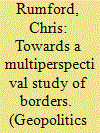

|
|
|
|
|
| Publication |
2012.
|
| Summary/Abstract |
The paper develops a non-state centric approach to the study of borders, building upon Balibar's 'borders are everywhere' thesis. It offers a critique of the assumption of consensus (mutual recognition of borders) in border studies. It is argued that borders do not have to be visible to all in order to be effective. The case for a multiperspectival border studies is then outlined: borders cannot be properly understood from a single privileged vantage point and bordering processes can be interpreted differently from different perspectives. A key dimension of a multiperspectival approach to border studies is examined in detail: borderwork, societal bordering activity undertaken by citizens. This is explored at several UK sites in order to demonstrate the ways in which borders are not always the project of the state, that they can exist for some (but not all), and can link people to the world beyond the 'local' border.
|
|
|
|
|
|
|
|
|
|
|
|
|
|
|
|
| 6 |
ID:
188528
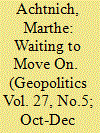

|
|
|
|
|
| Summary/Abstract |
Migrants’ mobilities in the fragmented state context of Libya are shaped by different dynamics of waiting. These dynamics emerge through intersections between transnational and local bordering practices. Examining the temporal effects of borderwork ethnographically by focusing on the lives of migrants who attempt to move on by boat to Europe, this article goes beyond depictions of waiting as an empty lived experience of time, to locate it within wider migration and mobility economies in borderlands. Migrants’ time is reproduced through intimate practices of care and labour and the ways in which they intermesh with a clandestine and often predatory economy where state and criminal actors profit from mobile lives. Focusing on migrants’ lived experiences of waiting to move on in contexts of fragmented state authority like Libya allows us to challenge fixed understandings of temporality as well as state-linked borderwork and its effects in Europe’s wider borderlands.
|
|
|
|
|
|
|
|
|
|
|
|
|
|
|
|